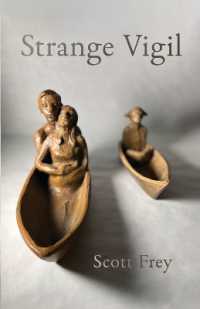- ホーム
- > 洋書
- > 英文書
- > Religion / Ethics
Full Description
This book analyses the religious ideology of a Tamil reformer and saint, Ramalinga Swamigal of the 19th century and his posthumous reception in the Tamil country and sheds light on the transformation of Tamil religion that both his works and the understanding of him brought about.
The book traces the hagiographical and biographical process by which Ramalinga Swamigal is shifted from being considered an exemplary poet-saint of the Tamil Śaivite bhakti tradition to a Dravidian nationalist social reformer. Taking as a starting point Ramalinga's own writing, the book presents him as inhabiting a border zone between early modernity and modernity, between Hinduism and Christianity, between colonialism and regional nationalism, highlighting the influence of his teachings on politics, particularly within Dravidian cultural and political nationalism. Simultaneously, the book considers the implication of such an hagiographical process for the transformation of Tamil religion in the period between the 19th -mid-20th centuries. The author demonstrates that Ramalinga Swamigal's ideology of compassion, cīvakāruṇyam, had not only a long genealogy in pre-modern Tamil Śaivism but also that it functioned as a potentially emancipatory ethics of salvation and caste critique not just for him but also for other Tamil and Dalit intellectuals of the 19th century.
This book is a path-breaking study that also traces the common grounds between the religious visions of two of the most prominent subaltern figures of Tamil modernity - Iyothee Thass and Ramalingar. It argues that these transformations are one meaningful way for a religious tradition to cope with and come to terms with the implications of historicization and the demands of colonial modernity. It is, therefore, a valuable contribution to the field of religion, South Asian history and literature and Subaltern studies.
The Open Access version of this book, available at http://www.taylorfrancis.com/books/e/9781315794518 has been made available under a Creative Commons Attribution-Non Commercial-No Derivatives 4.0 license.
Contents
Introduction; Part I: Retrieving Ramalinga Swamigal Chapter 1: Pulavar to Prophet. A 19th century Religious Life; Chapter 2: Ramalingar the Master and the Cittar; Chapter 3: The Context of Compassion; Chapter 4: Hunger and Compassion - the Cīvakāruṇya oḻukkam; Chapter 5: Anti-Hagiography; Part II: Re-creating Ramalinga Swamigal Chapter 6: Śaiva Ferment; Chapter 7: The Life and Times of Ñāṉiyār Āṭikaḷ (1873-1942); Chapter 8: Tiru.Vi.Ka: Ramalingar's Camaracam as Radical Equality; Chapter 9: Ma. Po. Ci: Ramalinga Swamigal and Modern, Dravidian Sainthood; Conclusion; Bibliography







